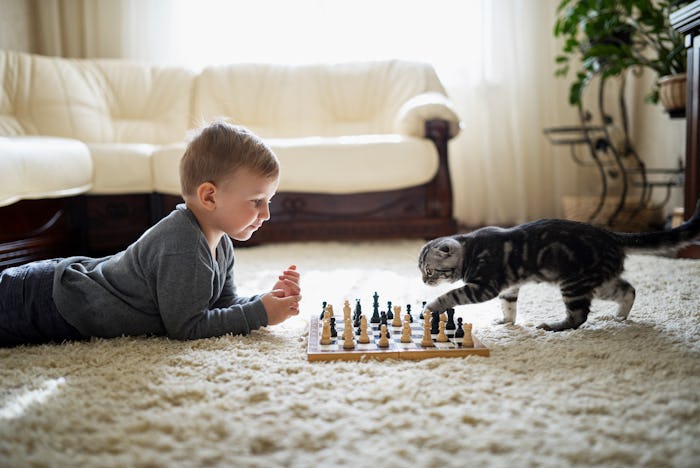Life

Here's What Happens In Your Cat's Brain When Your Kids Go Back To School
Back to school season inspires a mix of emotions for your family members. The little ones are nervous and excited; you're thrilled to have your home back but simultaneously sad to lose time with people you spent endless summer hours with. But how does your cat feel when your kids go back to school? Well, it varies from feline to feline, but overall, they'll probably be stoked.
"The way cats feel when kids go back to school depends on how your kids treat the cats," explains Dr. Jaclyn Levin, DVM of Arkle Veterinary Care in Atlanta, GA, to Romper via email. "The vast majority [are] probably relieved. There aren’t many parents who take time to teach little kids how to treat cats and that means many cats are terrorized by kids in the house without parents knowing." That's not to suggest your kids are literally torturing your cat; it's just that cats and kids aren't exactly compatible.
For instance, "many urban pet cats may be suffering chronic stress, as a result of lack of control over their environment" according to "The ‘Feline Five’: An Exploration Of Personality In Pet Cats (Felis catus)," a research study published in Plos One, which explores the different personalities animals have based on their environments and owners. And Frontiers of Veterinary Science, a global, peer-reviewed journal that focuses on interdisciplinary veterinary research, found that "cats were generally more likely to be affectionate toward adults in the family than to children ages 3–5 years old," as adults are more likely to respect the cat's needs. Cats don't always want to be affectionate, and adults are better at recognizing and acknowledging that.
They may seem independent, but cats do actually have a lot of needs, which can be tough to meet when you've kids to worry about all day, per Dr. Judith Stella, Science Fellow with the APHIS-Center for Animal Welfare, and Dr. Candace Croney, Director of Center For Animal Welfare Science and professor at Purdue University. You'll have more time to meet those needs when you're not watching the kids, so your cat might get the attention they've been craving when the kids head back to the classroom.
However, not every cat will be thrilled when your home becomes a kid-free zone. "If your cats seem to enjoy spending time with the kids, they may be a little upset by [the change] but will be fine seeing that they come back every day," says Dr. Levin of back to school season. Cats who have close relationships to kids might actually be counting down the moments until the little ones are home. Although they can't actually read clocks, a study published in the Acta Neurobiologiae Experimentalis Journal found that felines are able to differentiate between different amounts of time, so they'll definitely notice when the kids are gone for a long time. And cats need stimulation, so your kiddo's absence might leave them feeling bored, as PetMD pointed out.
Again, their reaction will depend on the kind of relationship your cat has with your child. "Parents who had cats prior to kids" are generally better at guiding children on how to care for cat according to Dr. Levin. Her biggest piece of advice for families with small children and cats is to "teach your kids to let cats come to them," as the cat will be more likely to respond to affection when it's on their terms. She also recommends telling kids explicitly not to pull their tails, chase them, or mess with their fur, as they won't instinctually know cats don't like that. It will be easier to foster a healthy relationship if kids have an understanding of a cat's ground rules.
Bottom line, your cat's reaction to the kids going back to school really depends on several factors. They could be relieved or anxious depending on the relationship they have with your kids. It's a time of transition for everybody so give your cat some space when your kids head off, and follow their cues. See this as a chance to spend more time with your furry friend.